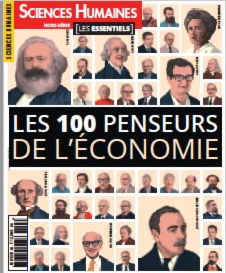
Nelson and Winter among Top 100 Economic Thinkers
This is the English translation of Dortier's essay explaining why Nelson and Winter are among the top 100 economists of all time.Essay by Jean-Francois Dortier
RICHARD R. NELSON (1930-) and SIDNEY WINTER (1935-) — THE EVOLUTIONIST MODEL
Richard Nelson and Sydney Winter attempt to rethink economic dynamics on an evolutionary basis: companies appear as organisms living seeking, in order to survive, to innovate in a changing environment.
In 1982 appeared in the United, An Evolutionary Theory of economic change (in French, An evolutionary theory of change economic). The book is signed by two American academics, Richard R. Nelson (1930-) and Sidney Winter (1935-). The two men have been working together for ten years already around of an ambitious project: fundamentally rethink science economic from the idea of evolution. R. Nelson and S. Winter work on technological innovation, one of the key problems in the economics of the time. How to integrate technical progress into economic models? The challenge is both theoretical but also strategic: in parallel with their university activities, R. Nelson and S. Winter work for the Rand Corporation, which advises companies and public bodies on investment choice.
The fictions of classical economics
The two men propose a new approach which is differs from classical economics, based on axioms unrealistic. According to them, the postulate of market equilibrium is by example invalidated in practice: the economy is experiencing phases of growth and obvious crises. In addition, growth depends in part on progress technical: the IT sector, then in full swing, in testifies. On this point, R. Nelson and S. Winter follow in the wake of by Joseph Schumpeter (1883- 1950), which they will bring up to date. They also stand out from classical economics in another point: the postulate of rationality. The two authors adopt the theses of Herbert Simon (1916-2001), the theorist of “rationality limit “. According to this economist, homo oeconomicus, an individual infallible and perfectly informed calculator, is a pure theoretical fi ction. To make their decisions, economic agents (business leaders, consumers, etc.) have limited information and approximate calculation capacities, Rather than optimal choices, they are reduced to reasonable estimates than rational estimates. The legacies of J. Schumpeter and H. Simon will begin R. Nelson and S. Winter in an ambitious adventure: formulate a new paradigm of economics that would approach the maximum of the real behavior of the fi rms. Their news Theoretical framework is based on four key concepts: competence, routine, research and selection. Competence is know-how mobilized in a field precise (such as knowing how to swim or serving in tennis). In a company, a skill has three attributes: it is a programmed (and therefore automated), tacit (internalized) knowledge and consistent with a goal. The “routine” is the second key notion. In an organization, a routine is a way of acting that has been formalized: a recipe kitchen in the food industry or the “circuit of copy ”in a magazine are organizational habits. A routine is not necessarily the most effective approach, but it allows agents to understand each other and adjust their conduct. They give rise to “armistices”, that is to say arbitration of disputes based on a common frame of reference. The third key notion is that of “research”. Faced with the unknown, the organization must adapt and therefore innovate. For it it explores new avenues. But this exploration does not correspond not looking for an optimal solution: it is experimental trial and error, or benchmarking (imitation competition). Selection, the fourth concept, is the equivalent in economics of natural selection applied to companies: they innovate in an attempt to survive but offer new products has been scrutinized for demand. Some innovations will be adopted, others will not. Armed with these concepts, R. Nelson and S. Winter will attempt a new modeling of the economic system which does not aim the search for market equilibrium but on the contrary helps to think about change and business development trajectories. Evolutionary theory makes it possible to understand in particular a singular phenomenon of the economy: “dependencies to the trail ”(see text below). The seminal work of evolutionary theory written by R. Nelson and S. Winter opened a new path for think about the dynamics of the economy. But, we have to admit that nearly four decades after its publication, it has still not supplanted mainstream economic models. Some of these concepts have been adopted but their application remains limited to a specialized niche: that of the economics of innovation.
HOW “QWERTY” IMPOSED ON OUR KEYBOARDS
Where does the layout of the keys on a computer keyboard come from? The “qwerty” keyboard (azerty on the French keyboard) was invented in 1860 by the American Christopher L. Sholes (1819-1890). AT at the time, many competing machines were introduced on the market. The qwerty keyboard was neither the simplest nor the most functional for typing. C. Sholes placed the letters of so as to prevent the button bars from getting stuck together. His keyboard then prevailed: the Remington firm adopted it, and the first typing schools took, as early as 1880, the Remington model as a reference. A few more years later, other typewriters had solved the technical problem initial with much more ergonomic keyboards. But he was already too late. The “qwerty” format had become the standard. Competitors had more interest in going with the flow than wanting to change typists’ habits. The qwerty keyboard will remain unbeatable even after the invention of electric machines, then computers. A contingent initial cause can therefore cause a whole sector in a given direction without it then being possible to go back: these are what evolutionary economists call “path dependencies.”
Translated by Google Translate from the French article.
back to top
Permanent URL for referencing this page: http://etss.net/index.php?/weblog/reference/nelson_and_winter_among_top_100_economic_thinkers/

